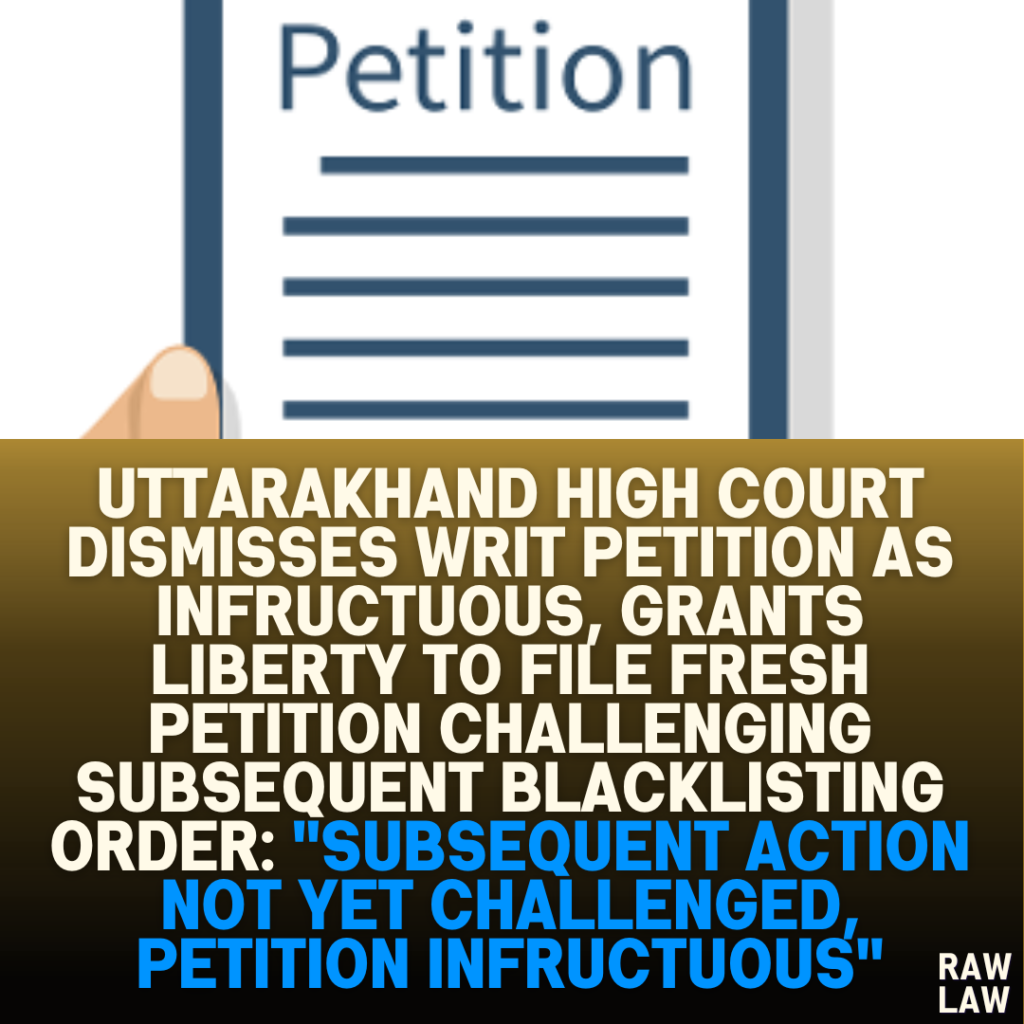Court’s Decision:
The Uttarakhand High Court dismissed the writ petition as withdrawn, granting the petitioner liberty to file a fresh petition against a subsequent blacklisting order that was passed on 02.08.2024.
Facts:
The petitioner was awarded a contract for transportation of timber by the Uttarakhand Forest Development Corporation in 2023. Following issues in contract execution, the petitioner was blacklisted on 18.03.2024, and approached the Arbitrator, who set aside the blacklisting order. However, the Arbitrator upheld the forfeiture of the security deposit by the Divisional Logging Manager of Uttarakhand Forest Development Corporation, which led the petitioner to approach the court.
The petitioner sought various reliefs, including the quashing of the orders related to blacklisting and forfeiture of security deposit, as well as the release of outstanding dues from the timber transportation contract. During the proceedings, it was revealed that another blacklisting order had been passed on 02.08.2024.
Issues:
- Whether the blacklisting order and forfeiture of security deposit were legally valid.
- Whether the subsequent blacklisting order had any bearing on the current petition.
Petitioner’s Arguments:
The petitioner argued that the blacklisting order and the forfeiture of security deposit were unjust and that the outstanding dues related to the timber transportation contract should be released. Additionally, the petitioner submitted that the subsequent blacklisting order had not been served and that they intended to challenge it once received.
Respondent’s Arguments:
The respondents argued that the petitioner’s writ petition had become infructuous due to the passing of a subsequent blacklisting order on 02.08.2024, which had not been challenged. The respondents also assured the court that the necessary inquiry into the petitioner’s complaint regarding the Divisional Logging Manager would be completed within four weeks.
Analysis of the Law:
The court examined the matter under the lens of administrative law, particularly concerning the validity of blacklisting orders and forfeiture of security deposits. It noted that since the subsequent blacklisting order was not yet challenged, the current writ petition could not proceed.
Precedent Analysis:
No specific precedents were cited by the court in the proceedings.
Court’s Reasoning:
The court reasoned that since the subsequent blacklisting order had not been challenged, the current writ petition had become infructuous. The court also took into account the assurance from the respondents that the inquiry into the petitioner’s complaint would be conducted in a timely manner.
Conclusion:
The court dismissed the writ petition as withdrawn, with the petitioner being granted liberty to file a fresh petition against the subsequent blacklisting order. The respondents were also directed to provide the petitioner with a copy of the subsequent blacklisting order within 24 hours.
Implications: T
he decision reinforces the principle that when subsequent administrative orders are issued during legal proceedings, petitioners must appropriately challenge these orders to maintain the relevance of their petitions. The case also highlights the court’s willingness to allow petitioners the opportunity to challenge new developments in legal proceedings, ensuring that they are not deprived of their rights to challenge administrative actions.




Pingback: High Court of Karnataka Quashes Transfer of Undertrial to Belagavi Central Prison Due to Lack of Involvement in Misconduct and Application of Mind, Orders Immediate Return to Bangalore Central Prison - Raw Law
Pingback: Supreme Court Clarifies: Citizenship Resumption Rejected as Applicant Fails to Qualify Under Section 8(2) and Section 5(1)(b) of the Citizenship Act, 1955 - Raw Law